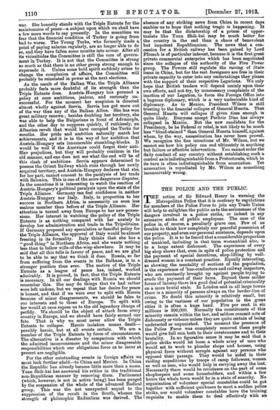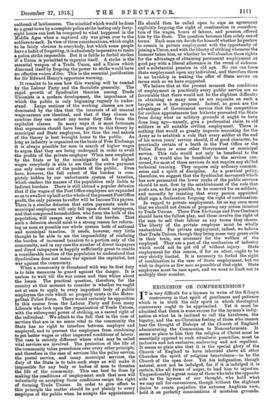THE POLICE AND THE PUBLIC.
THE action of Sir Edward Henry in warning the Metropolitan Police that it is contrary to regulations for members of the Police Force to join any Trade Union will help to enlighten the public as to the seriousness of the dangers involved in a police strike, or indeed in any extensive strike of public employees. The case of the police is, of course, a. peculiarly grave one. Few of us trouble to think how completely our peaceful possession of our property, and even our personal existence, depends upon the police. It is to be feared that a considerable proportion of mankind, including in that term womankind also, is to a large extent dishonest. The experience of every big shop shows that, even in spite of police protection and the payment of special detectives, shop-lifting by well- dressed women is a constant practice. Equally interesting, as showing the mentality of sections of the population, is the experience of 'bus-conductors and railway inspectors, who are constantly brought up against people trying to evade the payment of their fares. Beyond these milder forms of larceny ths,re is a good deal of potential criminality on a more brutal scale. In London and in all large towns there is a minority of persons always on the border-line of crime. No doubt this minority is relatively small, but owing to the vastness of our population in the great cities it is often a hu;1,,e band. Five per cent, in six millions is 300,000. Normally the constituents of this minority remain within the law, and seldom commit acts of dishonesty or violence unless they are quite certain of being undetected or unpunished. The moment the presence of the Police Force was completely removed these people would give full rein both to their covetousness and to their brutality. In no figurative sense it may be said that a police strike would let loose a whole army of men who would set to work to plunder shops and houses, using physical force without scruple against any persons who opposed their passage. They would be aided in their raiding expeditions by troops of camp followers, women as well as men, who would help in carrying away the loot. Necessarily there would be resistance on the part of some shopkeepers and some householders, and within a few hours the whole town would be in a state of anarchy. No organization of volunteer special constables could be gut together with sufficient quickness to meet a sudden police strike, nor would volunteer constables have the training requisite to enable them to deal effectively with au outbreak of lawlessness. The mischief which would be done to a great town by a complete police strike lasting only forty- eight hours can best be compared to what happened in the Middle Ages when a captured city was given over to the soldiers to sack. In view of these considerations, which ought to be fairly obvious to everybody, but which some people have a habit of forgetting, it is absolutely imperative to make a police strike impossible. But it is futile to forbid strikes if a Union is permitted to organize itself. A strike is the essential weapon of a Trade Union, and a Union which disarmed itself by forgoing the power to strike would have no effective raison dare. This is the essential justification for Sir Edward Henry's opportune warning.
It remains to be seen how this warning will be treated by the Labour Party and the Socialists generally. The rapid growth of Syndicalist theories among Trade Unionists is a modern development, the importance of which the public is only beginning vaguely to under- stand. Large sections of the working classes are now dominated by the idea that the interests of all manual wage-earners are identical, and that if they choose to combine they can extort any terms they like from the capitalist classes In many ways it is most fortunate that expression should have been given to this theory by municipal and State employees, for thus the real nature of the theory is best brought home to the public. As long as industry is organized on the basis of Free Exchange it is always possible for men in search of higher wages to argue that they are being underpaid in order to swell the profits of the private employer When men employed by the State or by the municipality ask for higher wages everybody is able to see that the extra payment can only come out of the pockets of the public. Even here, however, the full extent of the burden is com- pletely hidden by our unfortunate system of taxation, which renders the masses of the population only liable to indirect burdens There is still abroad a popular delusion that if the wages of the Post Office employees are expanded so as to swallow uphalf orthe whole of the present PostOffice profit, the only persons to suffer will be Income Tax payers. There is a similar delusion that extra payments made to municipal employees will only fall upon direct ratepayers, and that compound householders, who form the bulk of the population, will escape any share of the burden. That such a delusion should exist is a strong reason for reform- ing as soon as possible our whole system both of national and municipal taxation. It needs, however, very little thought to be able to see the impossibility of confining the burden of increased taxation to a portion only of the community, and in any case the number of direct taxpayers and direct ratepayers is happily sufficiently great to enable a considerable section of the population to understand that Syndicalism does not mean war against the capitalist, but war against the community.
When a community is threatened with war its first duty is to take measures to guard against the danger. It is useless to wait till the war comes and then whine about the losses. The practical question, therefore, for the country at this moment to consider is whether we ought not at once to apply to every important body of public employees the rule which so properly exists in the Metro- politan Police Force. There would certainly be opposition to this course from the Labour Party and from many Liberals who look upon the organization of Trade Unions, with the subsequent power of striking, as a sacred right of the individual. We admit to the full that in the case of services that are in no sense vital to the community the State has no right to interfere between employer and employed, and to prevent the employees from combining to get better wages or other improved conditions of labour. The case is entirely different where what may be called vital services are involved. The protection of the life of the community takes precedence over every other principle, and therefore in the case of services like the police service, the postal service, and many municipal services, the duty of the State is to take such steps as will make it impossible for any body or bodies of men to threaten the life of the community. This can best be done by making the conditions of employment such that men will voluntarily on accepting those conditions resign the right of forming Trade Unions. In order to give effect to this principle the matter should be put plainly to every employee of the public when he accepts the appointment. He should then be called upon to sign an agreement explicitly forgoing the right of combination in considera- tion of the wages, hours of labour, and pension offered him by the State. The question becomes then solely one of terms. Each man can decide for himself whether he prefers to remain in private employment with the opportunity of joining a Union, and with the liberty of striking whenever the humour takes him, or whether he will abandon these rights for the advantage of obtaining permanent employment at good pay with a liberal allowance in the event of sickness and a substantial pension in old age. No one can force State employment upon any individual, and therefore there is no hardship in making the offer of State service on terms such as we have suggested.
We believe that at the present moment the conditions of employment in practically every public service are so favourable that there would not be the slightest difficulty in obtaining as many men as are requisite on such a bargain as is here proposed. Indeed, so great are the advantages of Government service that the competition for civilian appointments has hitherto prevented the State from doing what on military grounds it ought to have done long ago—namely, give a preferential claim to old soldiers in all suitable civilian employment. There is nothing that would so greatly improve recruiting for the Army as to establish a rule that every soldier at the end of his seven years' service should, if of good character, be practically certain of a berth in the Post Office or the Police Force or some other Government or municipal service. This rule would not only be beneficial to the Army, it would also be beneficial to the services con- cerned, for most of these services do not require any skilled technical training. They require only ordinary common- sense and a spirit of discipline. As a practical policy, therefore, we suggest that the Syndicalist movement which has now permeated the lower ranks of the public services should be met, first by the establishment of the rule that posts are, as far as possible, to be reserved for ex-soldiers, and secondly by insisting that every person appointed shall sign a declaration forgoing the right of combination.
In regard to private employment, let us say once more that we should not dream of proposing any action inimical to Trade Unions. There Free Exchange and Free Contract should have the fullest play, and these involve the right of the men to sell their labour on any terms they choose. The liberty of the private employee must be wholly unshackled. For private employment, indeed, we believe that Trade Unions, though they bring some very grave evils in their train, are necessary for the welfare of the employed. They are a part of the mechanism of industry which could not be got rid of without injury. State employment for this reason, if for no other, ought to be very strictly limited. It is necessary to forbid the right of combination in the case of State employment, but we wish to deprive as few men as possible of that right. State employees must be men apart, and we want to limit not to multiply their number.



































 Previous page
Previous page